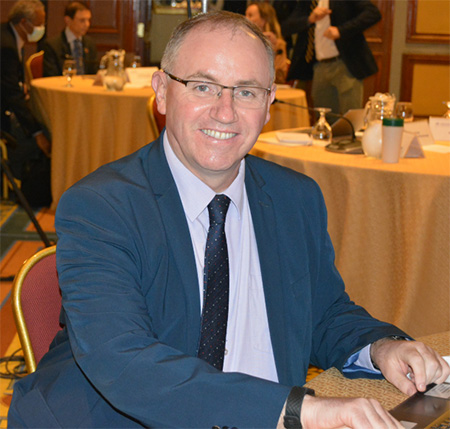 Regional Human Resource Manager Gerard Mc Donnell Managers and staff are being urged to explore modalities of work that give staff opportunities to broaden their experience while helping WHO meet changing business needs.
Regional Human Resource Manager Gerard Mc Donnell Managers and staff are being urged to explore modalities of work that give staff opportunities to broaden their experience while helping WHO meet changing business needs.
Surge support and short-term developmental assignments offer both immediate and long-term benefits to staff members and the Organization.
Surge support is typically associated with emergencies and is used for acute events that require enlarged staff capacity for a duration of some months. Although travel restrictions were in place during the COVID-19 pandemic, surge support remained ongoing.
Short-term developmental assignments provide opportunities to partake in a programme and/or provide support for a specific standard of time.
Both arrangements allow staff members to use and build their skills in a new context within WHO without transferring permanently, while WHO benefits from developing internal talent, facilitating networking, increasing its flexibility, and more.
Regional Human Resource Manager Gerard Mc Donnell encourages the use of short-term developmental assignments. He emphasizes that they can raise the ceiling for participants’ future professional and career growth, and managers also gain from the enhanced skillsets, networks and motivation of their staff.
“Everyone should get an equal chance” he says, noting that guidelines are available to ensure that short-term assignments are effective development opportunities.
Mc Donnell stresses the value of using short-term assignments to gain experience beyond the Regional Office and within country offices. While travel restrictions during the COVID-19 pandemic limited such mobility, more options are now becoming available.
Maryan Ibrahim, a programme assistant from the GHI Department currently undergoing an Short-term developmental assignments in the Chef de Cabinet’s Department, says her current role assisting in arrangements for the World Health Assembly and Regional Committee has given her a new perspective.
In such a short period, I saw the administrative issues from different views that have widened my horizons
Datu Marsuali, another staff member who previously served as an human resource assistant in the Business Operations Department at the Regional Office, agreed that her assignment had added value to her career by expanding her network, exposing her to best practices in field operations and teaching her how to deal flexibly with changing environments. She is currently based in WHO headquarters as an human resource associate within the Global Human Resources unit.
Regardless of the line of work and rank within an organization, setting realistic milestones for the foreseeable future made me more productive
Short-term developmental assignments can last for up to 6 months and need to be approved in advance by the staff member’s supervisor through a one-to-one developmental dialogue. For each assignment, terms of reference must also be formulated by the supervisor or manager in the receiving office.
Obtaining data about these work modalities can be challenging because applications for surge support are carried out between country offices rather than through the Regional Office. Gerard Mc Donnell is keen to establish a central focal point in the Regional Office to run applications for short-term developmental assignments and surge support, and believes advertising for both modalities of work through formal recruitment platforms would assist in gathering and obtaining data more efficiently.


